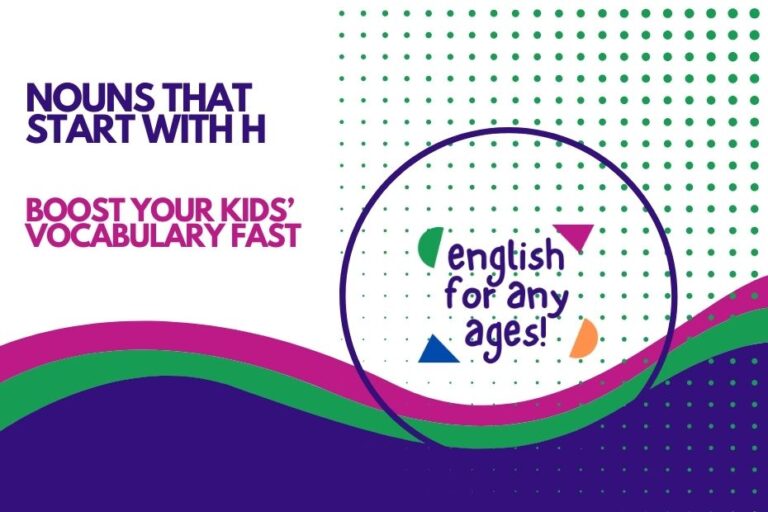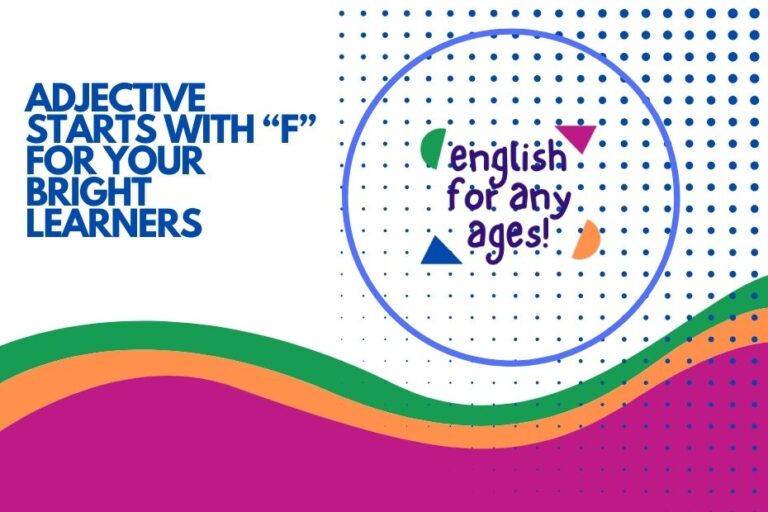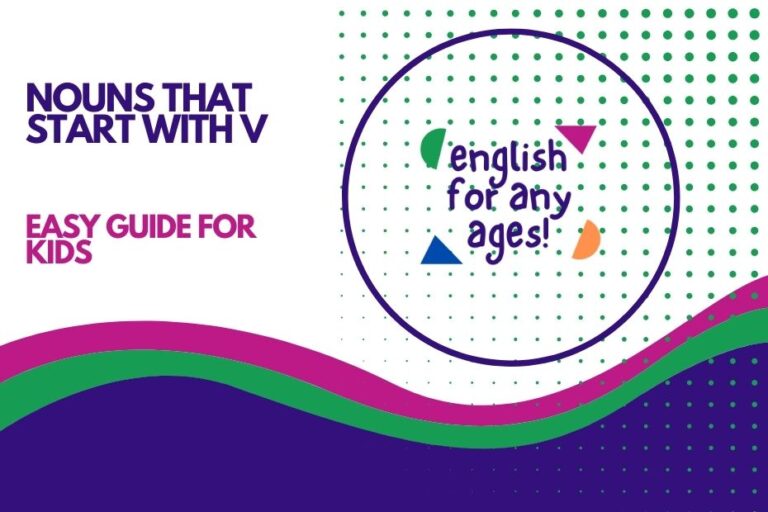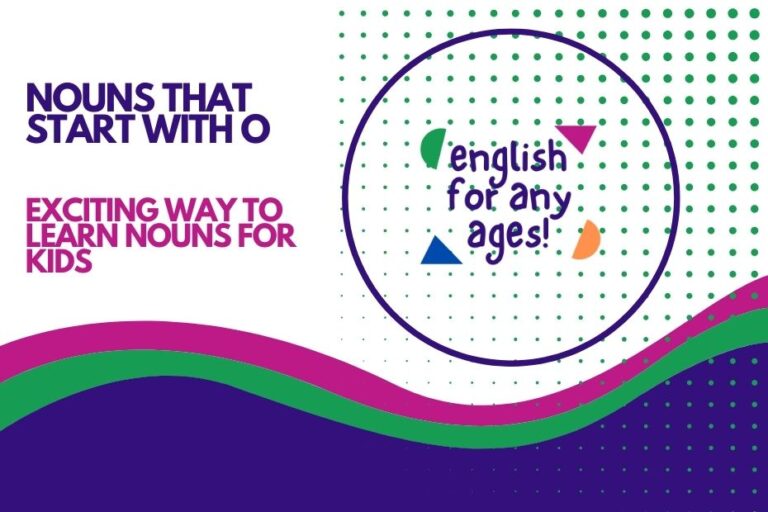Interrogative Adjectives Starting with W
1
What
“What” is an interrogative adjective because it is used to ask about something specific, like “What color is the sky?”
2
Which
“Which” is used to ask about a particular thing from a group, like “Which toy do you want?”
3
Whose
“Whose” asks about ownership, like “Whose book is this?”
4
When
“When” asks about time, like “When is your birthday?”
5
Where
“Where” is used to ask about a place or location, like “Where is my toy?”
Possessive Adjectives Starting with W
1
We
“We” shows something belongs to a group of people, like “We have a big house.”
2
Whose
“Whose” is used to ask about possession, like “Whose toy is this?”
3
Weren’t
“Weren’t” can be used to express something was not owned or done by someone, like “Weren’t their shoes?”
4
What’s
“What’s” is a short form of “What is” used for showing possession, like “What’s my favorite color?”
5
Would
“Would” shows a conditional possession, like “Would your mom like to help?”
Proper Adjectives Starting with W
1
Western
“Western” is a proper adjective because it refers to something specific, like “Western movies.”
2
Woolen
“Woolen” is a proper adjective because it refers to items made of wool, like “Woolen sweaters.”
3
White
“White” is a proper adjective because it refers to something of a specific color, like “White snow.”
4
Warm
“Warm” is a proper adjective because it describes something with a specific temperature, like “Warm blanket.”
5
Wooden
“Wooden” is a proper adjective because it refers to objects made of wood, like “Wooden chairs.”
5 Compound Adjectives Starting with W
1
Well-known
“Well-known” is a compound adjective because it is made of two words, “well” and “known”, that describe something famous or widely recognized.
2
White-haired
“White-haired” is a compound adjective because it combines “white” and “haired” to describe someone with white-colored hair.
3
Wide-eyed
“Wide-eyed” is a compound adjective because it uses “wide” and “eyed” to describe someone who is surprised or amazed.
4
Warm-hearted
“Warm-hearted” is a compound adjective because it is formed by “warm” and “hearted”, describing a kind and caring person.
5
Water-proof
“Water-proof” is a compound adjective because it combines “water” and “proof”, describing something that is resistant to water.
5 Descriptive Adjectives Starting with W
1
Warm
“Warm” is a descriptive adjective because it tells us the temperature of something, like a warm cup of milk.
2
Wild
“Wild” is a descriptive adjective because it describes something that is untamed or not controlled, like wild animals in the jungle.
3
Wonderful
“Wonderful” is a descriptive adjective because it tells us that something is really great or amazing, like a wonderful day at the park.
4
Wobbly
“Wobbly” is a descriptive adjective because it describes something that moves unsteadily or shakes, like a wobbly table.
5
Wide
“Wide” is a descriptive adjective because it tells us that something is large from side to side, like a wide street or wide eyes.
5 Attributive Adjectives Starting with W
1
White
“White” is an attributive adjective because it describes the color of something, like a white shirt or white snow.
2
Wet
“Wet” is an attributive adjective because it describes something that is covered with water or moisture, like wet clothes after a rain.
3
Wide
“Wide” is an attributive adjective because it describes something that has a large distance between its sides, like a wide river or wide road.
4
Wavy
“Wavy” is an attributive adjective because it describes something that has a wave-like pattern or shape, like wavy hair or wavy water.
5
Worn
“Worn” is an attributive adjective because it describes something that is used or old, like worn shoes or a worn-out toy.
5 Comparative Adjectives Starting with W
1
Warmer
“Warmer” is a comparative adjective because it compares the temperature of two things, like warmer weather or a warmer blanket.
2
Wider
“Wider” is a comparative adjective because it compares the width of two things, like a wider road or a wider smile.
3
Weaker
“Weaker” is a comparative adjective because it compares the strength of two things, like a weaker rope or a weaker person.
4
Worse
“Worse” is a comparative adjective because it compares the quality of two things, like worse food or worse weather.
5
Warier
“Warier” is a comparative adjective because it compares how cautious or careful two things or people are, like a warier animal or a warier child.
5 Predicative Adjectives Starting with W
1
Warm
“Warm” is a predicative adjective because it describes the subject (like “The food is warm”). It shows the state of the subject.
2
Wide
“Wide” is a predicative adjective because it describes the subject (like “The river is wide”). It is used after a linking verb to describe the subject.
3
Worried
“Worried” is a predicative adjective because it describes the subject’s feeling (like “She is worried”). It is used after a linking verb to tell us the state of the subject.
4
Worse
“Worse” is a predicative adjective because it compares the subject to another (like “This game is worse”). It shows a state of comparison.
5
Wonderful
“Wonderful” is a predicative adjective because it describes the subject’s quality (like “The movie is wonderful”). It tells us about the subject after a linking verb.
5 Superlative Adjectives Starting with W
1
Worst
“Worst” is a superlative adjective because it shows the lowest quality or condition compared to all others, like “This is the worst cake.”
2
Wildest
“Wildest” is a superlative adjective because it describes the most extreme or untamed version, like “That was the wildest animal!”
3
Widest
“Widest” is a superlative adjective because it compares the width of something with all others, like “This is the widest road in town.”
4
Warmest
“Warmest” is a superlative adjective because it describes the highest temperature compared to others, like “This is the warmest blanket.”
5
Wonderful
“Wonderful” is a superlative adjective because it expresses the best or most amazing quality, like “That was the most wonderful gift!”
5 Distributive Adjectives Starting with W
1
Whole
“Whole” is a distributive adjective because it refers to all of something, like “I ate the whole cake.”
2
Widespread
“Widespread” is a distributive adjective as it indicates something affecting or involving many places or people, like “The widespread laughter made everyone smile.”
3
Wholesome
“Wholesome” is a distributive adjective because it describes something that is good for health or moral well-being, like “She enjoys a wholesome meal every day.”
4
Wild
“Wild” is a distributive adjective as it refers to something natural and untamed, like “The wild flowers are blooming everywhere.”
5
Wandering
“Wandering” is a distributive adjective because it indicates something that moves freely or without a fixed direction, like “He went on a wandering journey.”
5 Quantitative Adjectives Starting with W
1
Whole
“Whole” is a quantitative adjective because it refers to the total or complete amount of something, like “I ate the whole pizza.”
2
Wicked
“Wicked” can be a quantitative adjective as it is used to express a large degree of something, often in a fun or exaggerated way, like “That was a wicked amount of candy!”
3
Wild
“Wild” can be used quantitatively to describe an extreme or large amount of something, such as “They had a wild number of animals at the zoo.”
4
Worms
“Worms” can be used quantitatively when you talk about a large or small number of worms, like “There are many worms in the garden.”
5
Wave
“Wave” is used quantitatively to describe a large amount or repetition of something, like “The waves of people came to see the parade.”
5 Participial Adjectives Starting with W
1
Worried
“Worried” is a participial adjective because it describes the feeling caused by something, like “She looks worried because she lost her toy.”
2
Waving
“Waving” is a participial adjective because it describes the action of moving the hand, like “The waving crowd cheered for the runners.”
3
Worn
“Worn” is a participial adjective because it describes something that has been used a lot, like “Her worn shoes had holes in them.”
4
Whispering
“Whispering” is a participial adjective because it describes the action of speaking quietly, like “The whispering voices made it hard to hear the teacher.”
5
Wounded
“Wounded” is a participial adjective because it describes someone or something that is hurt or injured, like “The wounded animal needed help.”
5 Coordinate Adjectives Starting with W
1
Wet and Wild
“Wet and wild” is a coordinate adjective because both “wet” and “wild” describe the same noun, like “The wet and wild forest was exciting to explore.”
2
Wide and Wonderful
“Wide and wonderful” is a coordinate adjective because both words describe the same noun, like “The wide and wonderful ocean made the view amazing.”
3
Warm and Woolly
“Warm and woolly” is a coordinate adjective because both adjectives modify the noun, like “She wore her warm and woolly sweater in the cold.”
4
Wobbly and Weak
“Wobbly and weak” is a coordinate adjective because both words describe the same noun, like “The wobbly and weak chair could break if you sit on it.”
5
Wild and Wacky
“Wild and wacky” is a coordinate adjective because both adjectives describe the same noun, like “The wild and wacky party was full of surprises.”
5 Indefinite Adjectives Starting with W
1
Wicked
“Wicked” is an indefinite adjective because it describes something in a general sense without specifying what it is, like “He made a wicked joke that everyone laughed at.”
2
Wild
“Wild” is an indefinite adjective because it can describe something not controlled, like “The wild animal ran through the forest.”
3
Warm
“Warm” is an indefinite adjective because it can describe anything that feels a bit hot, like “I love wearing my warm jacket in the winter.”
4
Weak
“Weak” is an indefinite adjective because it generally describes something that lacks strength, like “The weak coffee didn’t keep me awake.”
5
Worn
“Worn” is an indefinite adjective because it describes something that has been used a lot, like “Her worn shoes showed she had walked many miles.”
5 Adjectives of Quantity Starting with W
1
Whole
“Whole” is an adjective of quantity because it tells you the complete amount, like “I ate the whole cake.”
2
Widespread
“Widespread” is an adjective of quantity because it shows something is found in many places, like “The problem was widespread in the city.”
3
Weak
“Weak” is an adjective of quantity because it shows something has a small amount of strength, like “The weak light was hard to see.”
4
Wild
“Wild” is an adjective of quantity because it describes something that is in a large or untamed state, like “There were wild animals everywhere.”
5
Way
“Way” is an adjective of quantity because it shows an extremely large amount, like “She is way better at singing than me.”
5 Appositive Adjectives Starting with W
1
Wise
“Wise” is an appositive adjective because it describes someone with good judgment, like “The wise owl gave advice.”
2
Witty
“Witty” is an appositive adjective as it describes someone with a clever sense of humor, like “The witty clown made everyone laugh.”
3
Wild
“Wild” is an appositive adjective because it describes something uncontrolled or untamed, like “The wild tiger roared.”
4
Warm
“Warm” is an appositive adjective because it describes something that feels comforting or cozy, like “The warm blanket felt soft.”
5
Weak
“Weak” is an appositive adjective because it describes something with little strength, like “The weak plant bent in the wind.”
5 Denominal Adjectives Starting with W
1
Wooden
“Wooden” is a denominal adjective because it describes something made from wood, like “wooden chair.”
2
Woolen
“Woolen” is a denominal adjective as it describes something made from wool, like “woolen sweater.”
3
Woven
“Woven” is a denominal adjective because it describes something made by weaving, like “woven basket.”
4
Waterproof
“Waterproof” is a denominal adjective as it describes something that is resistant to water, like “waterproof jacket.”
5
Wheelchair
“Wheelchair” is a denominal adjective because it describes a chair with wheels for mobility, like “wheelchair ramp.”
5 Absolute Adjectives Starting with W
1
Wet
“Wet” is an absolute adjective because something is either wet or not, with no in-between, like “wet clothes.”
2
White
“White” is an absolute adjective because something is either white or not, like “white paper.”
3
Wide
“Wide” is an absolute adjective as it describes something that is either wide or not, like “wide road.”
4
Wild
“Wild” is an absolute adjective because something is either wild or not, like “wild animal.”
5
Warm
“Warm” is an absolute adjective because something is either warm or not, like “warm blanket.”
5 Emphasizing Adjectives Starting with W
1
Wicked
“Wicked” is an emphasizing adjective because it makes something sound more extreme, like “wicked fun.”
2
Wonderful
“Wonderful” emphasizes how amazing something is, like “wonderful day!”
3
Wavy
“Wavy” emphasizes the shape or movement of something, like “wavy hair.”
4
Whopping
“Whopping” emphasizes something being very large, like “whopping big cake.”
5
Witty
“Witty” emphasizes how clever or funny someone is, like “witty jokes.”




